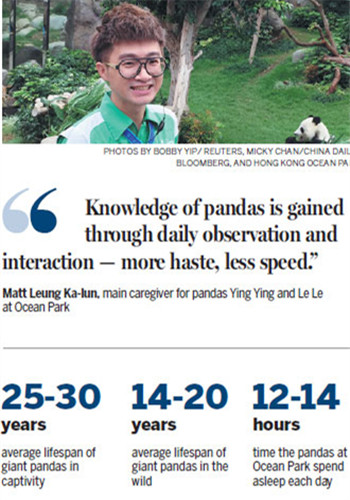
(Photo provided to China Daily)
"They are energetic and adventurous. Ying Ying likes to climb trees and sleep in the highest branches. We seldom trim her claws because she trims them herself during her climbs. Le Le is fond of prowling the panda house, playing with water and looking for toys we hide for him to find," Leung said.
In winter, the area around the panda house is covered with artificial snow as the park attempts to mimic the natural environment of Sichuan province, where pandas originate. The temperature is adjusted to approximate the Sichuan climate and the trainers even spray mist and smoke.
Leung's working day begins at 8:30 am, when he prepares the pandas' staple meal of bamboo shoots. An An consumes around 7 kg of bamboo a day, while the younger pandas eat about 27 kg between them.
Leung also makes snacks consisting of fruits, vegetables and high-fiber cookies to aid the pandas' digestion. The cookies are stuffed into plastic balls, challenging the pandas to look for them. "In the wild, giant pandas use their sense of smell to find food, so we hide the balls to stimulate their natural behavior and actively encourage them to forage," Leung said.
The three pandas sleep for 12 to 14 hours a day, and during rest hours they are fed four to five times. "Feeding them requires different tricks," Leung said.
Last year, An An who was born in 1986, became the second-oldest male giant panda in captivity. He has advanced arthritis and prefers to stay indoors, where he is treated to room service; tender, soft foods, such as shredded bamboo, are placed within easy reach and cooked yam is on the menu when he loses his appetite.


















































